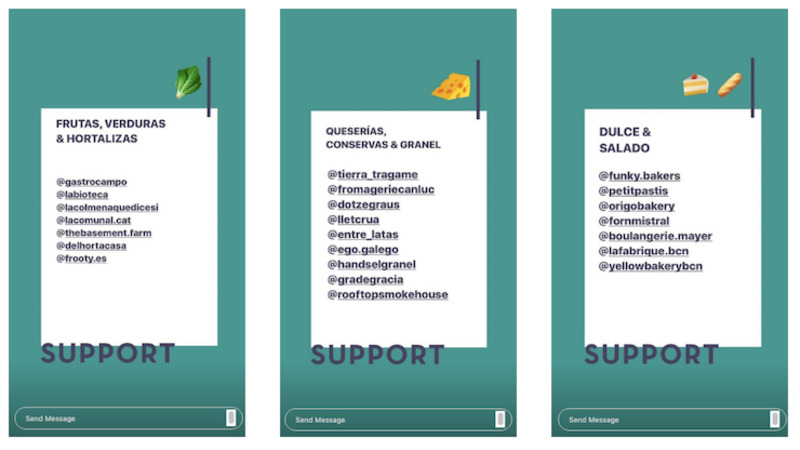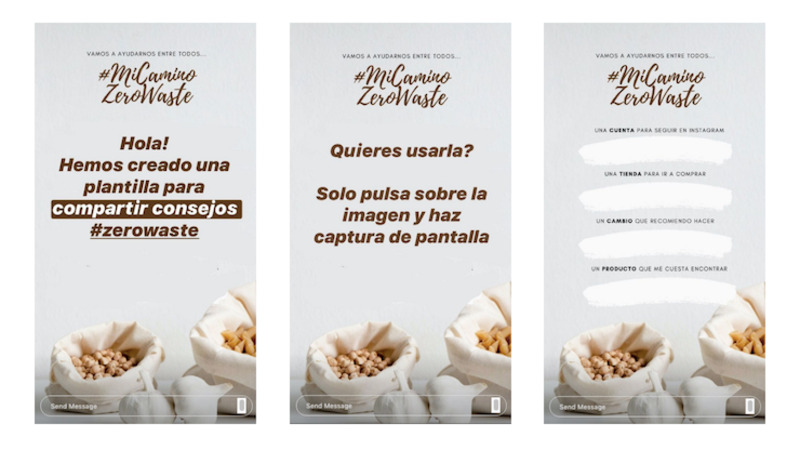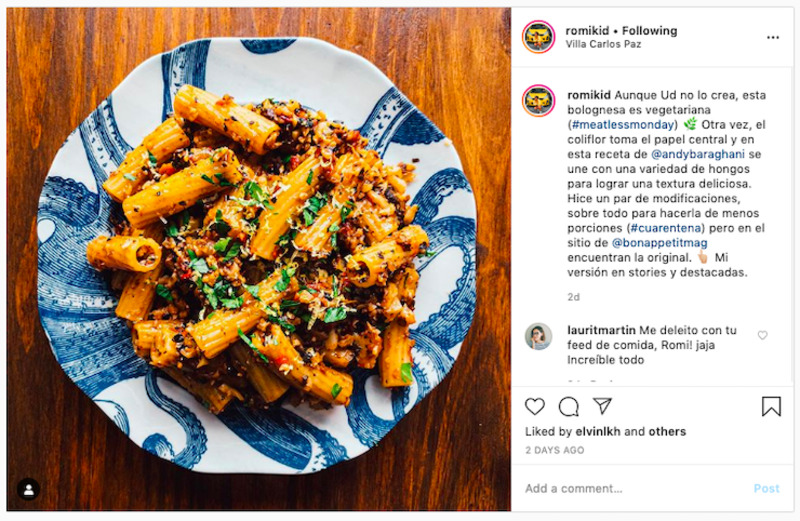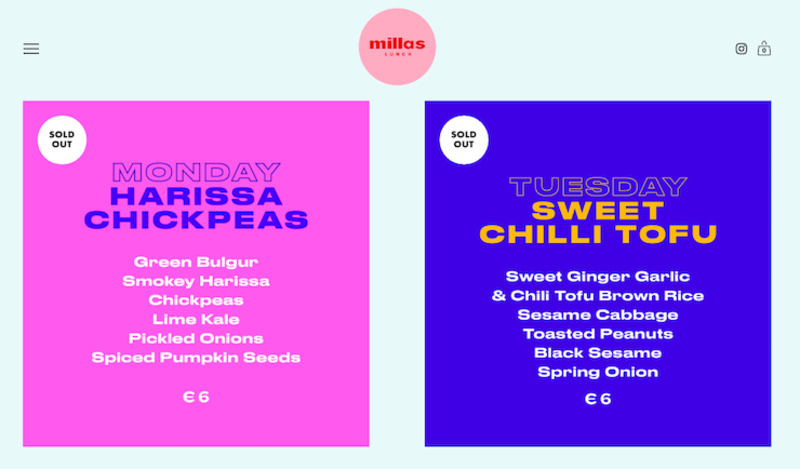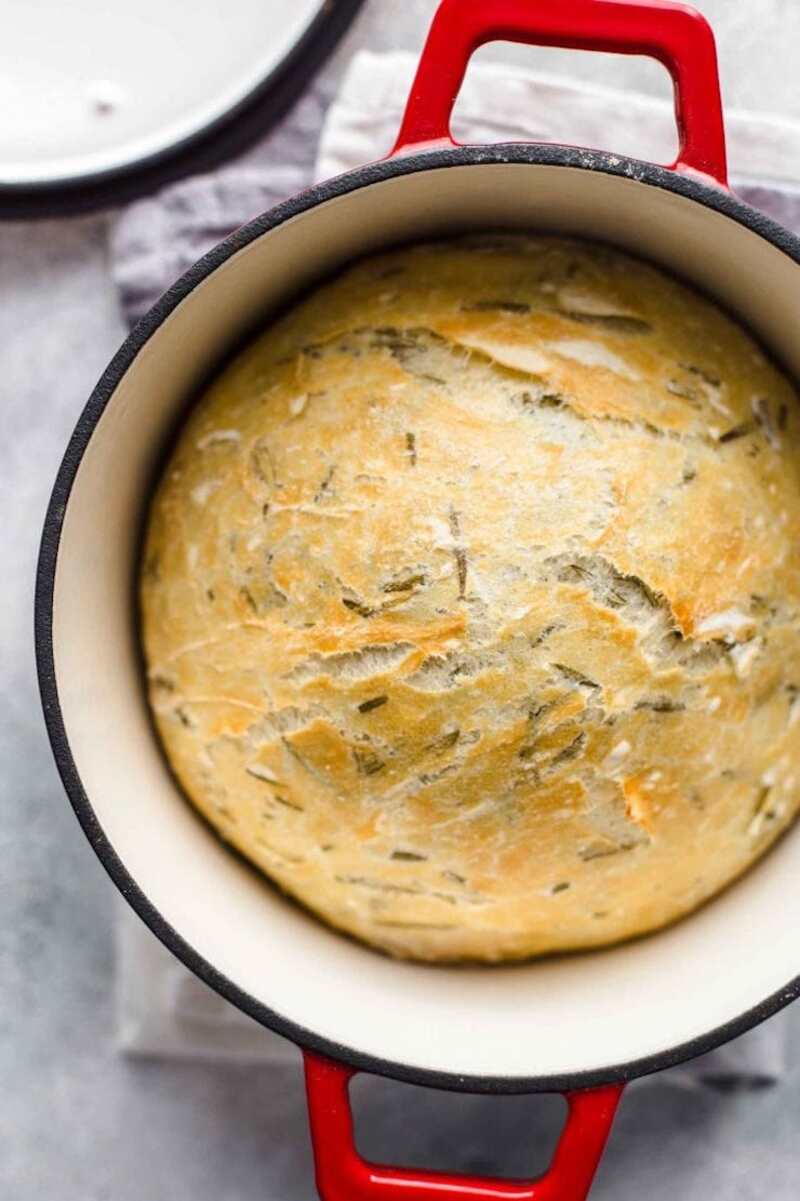As we’re about to start week eight of the official quarantine in Spain, not knowing when all of this will finally be over sparks dozens of uncertainties.
I don’t know about you, but I keep asking myself:
- When will I be able to walk outside and touch door knobs without being paranoid?
- When can I travel to meet and hug my friends and family?
- When can I start making plans again?
- When will I be able to return to my usual habits?
I reflect on all those every single day, but in this article I’d like to focus on the last one. And when I talk about habits, I refer specifically to those ones that help me live a more plastic-free and sustainable life.
The Sudden Shift of Habits
You see, for me those have changed drastically in the last two months. As I found myself in a more vulnerable group, I literally stopped going out. This meant suddenly having to order everything online.
My usual routine of buying fruits at the local “frutería”, getting eggs at a neighborhood market, and refilling my dishwasher detergent at a nearby zero waste store became suddenly impossible (at least at first).
I had to rethink all this and reorganize myself, but at the same time I needed to keep my fridge stocked. So my first thought was: Glovo market. Not bad, but as a result, tons of plastic suddenly filled my fridge. I couldn’t go on like this.
Not only did I start to wonder about continuing my zero waste shopping, but also became suddenly worried about something else:
Is Buying in Zero Waste Stores Safe During COVID-19?
I imagine this question crossed the minds of many out there and while it’s perfectly natural to be scared about it, we also need to try to be rational.
We are afraid of what we don’t see. At first my reaction was:
If I don’t know who is packing my cereal and what protocols they are following, I’m scared of buying there.
But then the reason has spoken. Here’s what I think and would advice:
- Research - go to the Instagram/Facebook account or website of your usual zero waste shop and see what information you can find on how they are handling the situation.
- Ask when in doubt - if you’re unsure how they handle store traffic, packaging, or delivery, just message them and ask for details or photos. Many are willing to share and might turn your question into a post.
- Keep in mind most shops that decided to go on are very serious about the situation and have implemented special measures such as dedicated pick up windows, cashless transactions, carbon-free deliveries, and limited people in the shop at any given time. Personnel is wearing masks and gloves and food handling is probably way more sanitary than when done by 20 different people in normal conditions.
11 Tips To Stay Mindful About Your Plastic Consumption During the Quarantine
It’s not easy to embrace change so quickly and forming new habits takes time, but here are my few tips on how to keep being mindful about the environment when it comes to grocery shopping during the quarantine.
1. Accept you cannot be perfectly zero waste now
This is how I see it: when starting a plastic-free journey in any conditions, it’s always healthy to accept that you cannot possibly be perfect at it from day one or day 50 for that matter.
And this is in a normal situation. Now we’re finding ourselves in a completely new one, forced to reinvent our habits once more. It’s really really ok to accept we won’t be perfect at it either.
So allow yourself to make little mistakes and just keep adjusting and optimizing your process.
2. Get Organized - Create a mind map
Here’s what I wish I had done from the very beginning before I went on a Glovo plastic extravaganza.
Smart after the fact, here’s what I would do now: take a piece of paper and create a list of the usual goods you buy - you can divide them by categories. Then assess whether the original purchase source is available or you need to adjust and seek a more responsible alternative.
This is how mine looks like (created after I made a few mistakes such as buying overpriced sliced cheese in Glovo that filled my fridge with plastic):
| Product | BC (Before COVID-19) | During the quarantine |
|---|---|---|
| Cheese | Cheese counter at a supermarket bringing my own container. | Cheese from the local producers bought at Colmena. Comes wrapped in paper. |
| Grains | Local zero waste store (that is not delivering to my neighborhood or needs a minimum order to deliver.) | Obbio eco-shop. Comes in biodegradable bags. |
| Fruits and veggies | Local “fruteria” around the corner bringing my own produce bags. | Seasonal and fresh produce from my cooperative Colmena (zero km). Delivered loose or in paper bags. |
| Fish & Meat | Local market bringing my own reusable plastic containers. | Meat from local producers from Colmena. Fish comes in paper, meat in plastic, but it’s produced locally so the carbon footprint is not high. |
| Bread | Local neighborhood bakery. Now closed. | Another small bakery called Origo that does online delivery. |
| Shampoo | Solid shampoo from Lush. Packed in paper bags. | Found alternatives from Vegala . Comes in a carton box. |
| Soap | Olive oil purifying soap bar from Chinata. Comes in paper. | Using the reserves until possible. BUT we did buy liquid soap since we wash hands much more now and needed a more hygienic and easy access to it. |
As you can see I started buying a lot more products from my cooperative which I only used for fruits and vegetables before. It turned out it covered most of our needs.
3. Support local business
There are some of us privileged to be able to work from home and continue with our professional lives with not much change. This isn’t the case for many small local businesses who either had to close or from one day to another change their entire business model offering delivery service or open online shops.
We list bulk shops as well as fresh produce initiatives which are either open or offer delivery below, but apart from buying from them, consider other ways of support:
- Spread awareness - tell your friends and social media connections about small businesses you’d like to support. It might bring them a customer or two.
See how guys from In And Out Barcelona do it in their SUPPORT story highlights:
Go Zerowaste App created a useful template which you can use to give recognition to local shops you buy in.
- Participate in new initiatives that were created in the last few weeks by entrepreneurs wanting to lend a helping hand:
One of them is Gastro Campo, a web based app where you can easily find a local producer and buy everything from coffee grains and bread, to olive oil and kombucha directly from their website.
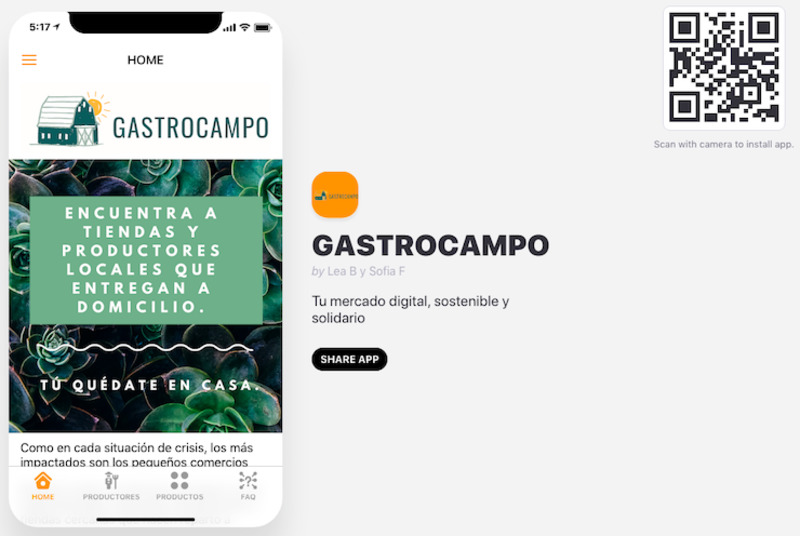
Another one is Subimos Las Persianas where you can take advantage of special offers added by small businesses which had to close their doors during the quarantine.
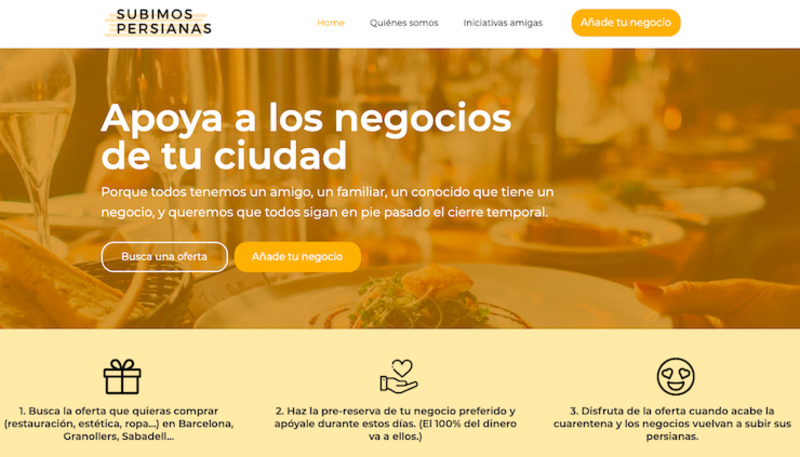
4. Buy more things, less frequently (in case you order online)
Consider buying once a week in bulk. Then freeze some products (like meat or fish) or prepare bigger quantities of food and freeze batches of it for easy and quick access later.
It’s also an ideal time to do some planning and create a schedule of what you will cook each day. That way you can plan what you need and make sure you will use it all.
Stock up on essentials such as quinoa, couscous, rice, lentils, or beans - those go with practically everything and are easy to prepare.
5. Do your research (we can help!)
Check which of your usual zero waste stores are open and which deliver in your neighborhood (we created a little list below).
6.Try out new recipes
Since it's quite easy to get fresh seasonal fruits and veggies (see the list of shops at the end) as well as grains, you can use this time to try new plant-based recipes reducing your meat consumption.
Prepare a quinoa salad, a mushroom ragout, or a cauliflower bolognese.
Here are some Instagram accounts to follow for inspiration and recipes:
7. Be mindful about takeout food
When ordering takeaway food, ask restaurants upfront how they handle packaging. We order from Les Tres a la Cuina who use only biodegradable containers.
Try to support local businesses that offer responsible (or carbon-free) delivery or order from people who prepare lunch menu and can send it to you by Glovo such as Milla’s Lunch.
8. Prepare things from scratch
If you have some time or would like to engage your kids in fun kitchen activities, consider making food from scratch.
It can be an easy homemade pasta, bread (like this supposedly easy one prepared in the Dutch Oven with rosemary), kombucha, or ginger beer.
You can also try to make your laundry detergent or zero waste cosmetics that don’t require many fancy ingredients.
Irina and Xenia from Zerowaste Bcn have many tutorials like this one:
9. Ditch plastic bottles
If you still haven’t switched to a home filter, it’s a good time to do so. If your trips to the supermarket are limited or you are ordering online, buying water in plastic bottles is just plainly impractical (apart from negatively contributing to the plastic pollution problem).
There are many eco-friendly filter alternatives out there but we can vouch for these two: Ecofiltro and TAPP Water . Both are biodegradable and designed with environment in mind.
5 liter Ecofiltro for home.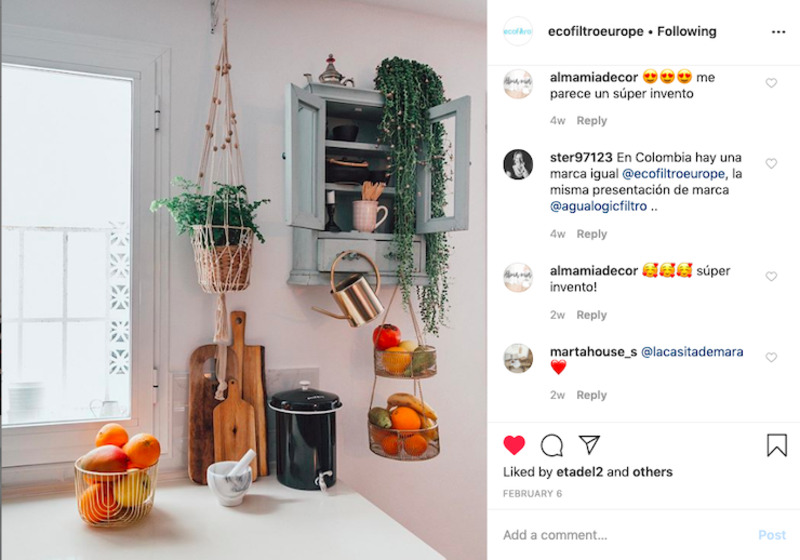
10. Reuse plastic you accumulated
Sometimes you end up with extra plastic and it's inevitable.
In case you do, give it a second life. You can use it for:
- Planting herbs
- Refilling your washing detergent or other cosmetics at bulk stores later
- Buying cheese, fish, or meat in markets later
- Organize your fridge drawers and keep produce in place
Planting herbs in used plastic bottles. Source: Pinterest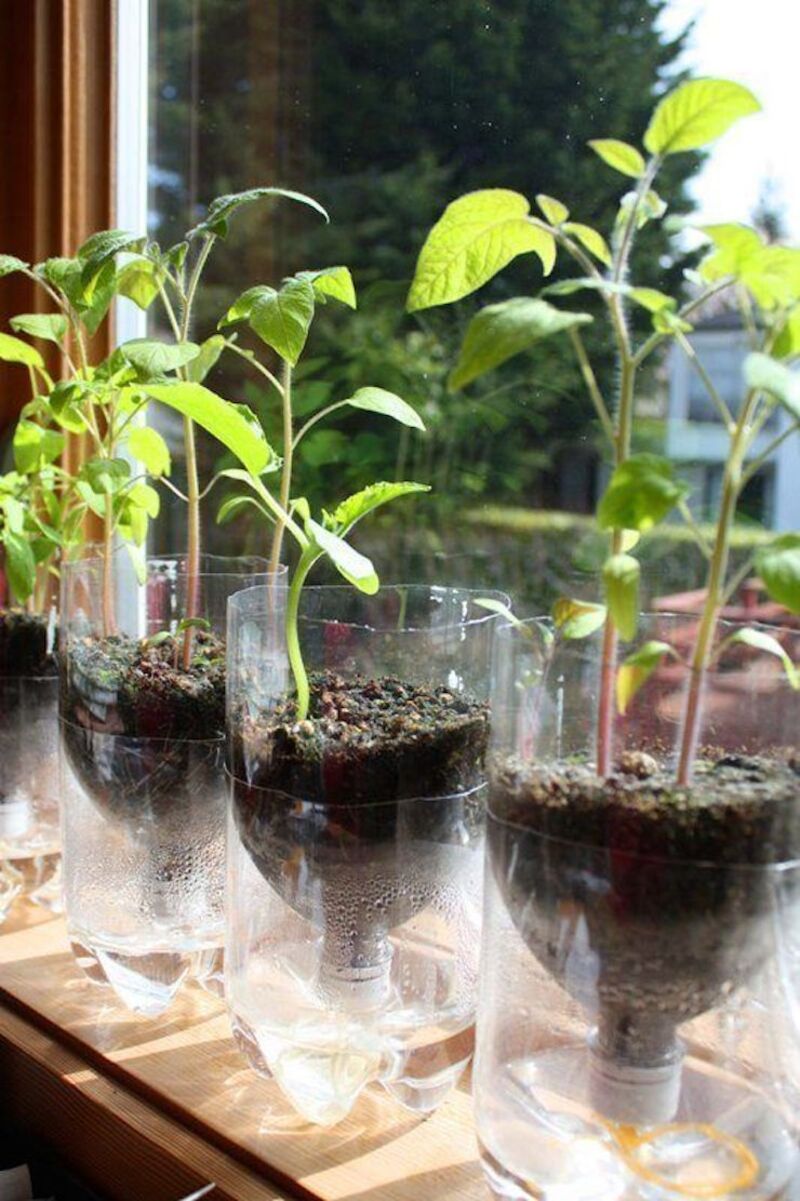
11. Freeze your organic waste
If you prefer not to take out your organic trash that often, consider freezing it. We have a plastic container for our freezer where we keep all our organic waste. It’s more hygenic, doesn’t smell, and it’s easier to dispose of when the time comes.
Zero Waste and Plastic-Free Shops in Barcelona That Are Open Or Offer Delivery
Since finding alternatives is not easy and many shops have their own schedule and different delivery conditions, we’ve decided to make a list.
Here are a few bulk shops organized by neighborhood, most of which can be found on Go Zerowaste app:
| Neighborhood | Zero Waste Shop | Schedule | Delivery |
|---|---|---|---|
| Raval & Sant Antoni | YES Future | Reduced (mornings) | Orders: Via Whatsapp. Carbon-neutral delivery by FastBcn. Min order: €15, Delivery fee: €4.50, Free for purchases over €50. |
| Grans de la terra | Reduced (mornings) | Orders: Via website. Delivery fee: €7 eur (in Raval). Details | |
| Monmas Kind Shop | Closed | Orders: By email and whatsapp. €4 for orders below €65. Details | |
| Idoni | Reduced (mornings) | Orders: By Whatsapp and phone. Details | |
| Gotico & Born | Casa Perris | Open all day | Orders: By email and Whatsapp, Details |
| Casa Gispert | Reduced (mornings) | Orders: Via website. Free above €50. | |
| Ananda Root | Open 10-19, Sat 10 -17 | Orders: By Whatsapp. Details | |
| Eixample | La Castafiore | Reduced (mornings) | Orders: By phone. Details |
| Obbio | Open all day | Orders: Via website, Whatsapp, or phone. Delivery €7. | |
| Casa Ruiz Granel | Mornings and afternoons | Via website , delivery via Plan B. Free delivery for orders above €60. For the rest: from €5.75 depending on the weight. Details | |
| Granel Eixample | Reduced (mornings) | None | |
| Gracia | Colibri | Reduced (mornings) | Orders: Minimum order €20. |
| Gra de Gracia | Open | Orders: By Whatsapp from €30. Details | |
| Al Gra bcn | Mornings and afternoons. | No delivery. | |
| El CamBio | Closed | Orders: Via website, Free delivery from €10. | |
| Poblenou | YES Future | same as above | |
| Vida Meva | Reduced (mornings or afternoons depending on the day) | Orders: Via Whatsapp or email. Details | |
| La Graneria del poblenou | All day with a break | None |
Keep in mind schedules and rules might have changed since we've created this table. Last updated: May 1st.
Local fruit and vegetable initiatives
And here is a little list of all the businesses that offer fresh fruit and vegetable delivery. Many of them offer other fresh, local, and seasonal products as well.
- La Colmena Dice que si!
- El Petit Bane
- Cal Fruitos
- La Tavella
- L’Hort d’en Didac
- Frutal Shakes
- Frooty
- Call Trilla
- Mes fresques que un enciam
- Disfruta Verdura
- Ecoagricultor
Hope this article was useful! If you have any other additions, please DM us through our [Instagram[(https://www.instagram.com/refillaqua/)] account!

Marta Olszewska
Co-founder of Refill Aqua striving to reduce single-use plastic waste. Marta is also a marketing consultant and growth mentor helping startups tell better stories through content.
